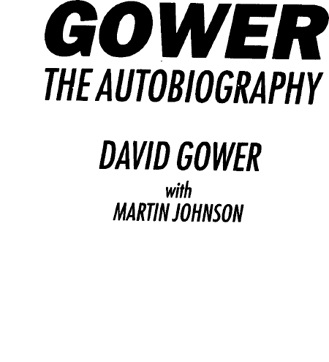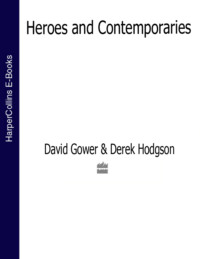
Полная версия
David Gower (Text Only)




Copyright
Fourth Estate
An imprint of HarperCollinsPublishers Ltd.
1 London Bridge Street
London SE1 9GF
First published in Great Britain 1992
Copyright © David Gower Promotions Ltd 1992
David Gower and Martin Johnson assert the moral right to be identified as the authors of this work
Tabular statistics supplied by Bill Frindall
Photographs supplied by Patrick Eagar, David Gower, Graham Morris, Adrian Murrell/Allsport and Syndication International
All rights reserved under International and Pan-American Copyright Conventions. By payment of the required fees, you have been granted the nonexclusive, nontransferable right to access and read the text of this ebook on-screen. No part of this text may be reproduced, transmitted, downloaded, decompiled, reverse-engineered, or stored in or introduced into any information storage and retrieval system, in any form or by any means, whether electronic or mechanical, now known or hereafter invented, without the express written permission of HarperCollins ebooks
HarperCollinsPublishers has made every reasonable effort to ensure that any picture content and written content in this ebook has been included or removed in accordance with the contractual and technological constraints in operation at the time of publication
Source ISBN: 9780006379645
Ebook Edition © NOVEMBER 2016 ISBN: 9780008235468
Version: 2017-01-13
Contents
Cover
Title Page
Copyright
Preface
ONE: Fun, style and excellence
TWO: Laid back – and think of England
THREE: A millionaire? That’s rich
FOUR: On the piste and on safari
FIVE: Out of Africa
SIX: ‘Bloody hell, Gower. Have you just come in?’
SEVEN: The officers’ mess
EIGHT: A total mess
NINE: A rum tour
TEN: A new board game: spot the England captain
ELEVEN: Steward Micky, Malcolm Devon and sacked again
TWELVE: On thin ice, and pressed into service
THIRTEEN: Baron von Gower’s low-flying circus
FOURTEEN: Grounded
FIFTEEN: You must be ****ing joking
Keep Reading
Gower – the career 1975–1992
Tabular statistics
Index
About the Author
Other Books By
About the Publisher
Preface
THIS book was conceived in the autumn of 1991, following a somewhat disappointing season of below par achievement, and with the problems of the 1990-91 tour of Australia still very much in mind. It was a time when the fortunes of my personal career were at a low ebb, and I was not at the peak of my form either in terms of performance or mental outlook.
There were several questions in my mind, which no doubt were also being asked elsewhere, largely along the lines of how I was going to approach the rest of my career, and whether or not I was going to be able to regain the sort of form that would allow me the chance to pass Geoff Boycott’s all-time England run scoring record, a target that had been there for the taking in Australia.
My subsequent omission from the Test side and ensuing poor form, with my perfectly logical further exclusion from that winter’s touring party, meant I had already begun to accept that number two in the list might be as far as I would ever get. This in itself was no problem as I could quite easily convince myself that what I had already achieved was not an overall disaster – and besides there are always other challenges in life.
However, a positive attitude was what I needed to begin the 1992 season in good shape, especially in view of the other potential problem lurking in the back of my mind. I knew that if this season did not bring success, I would be thinking very seriously about retiring from the game. My spirits were definitely at a low ebb!
Happily, I returned to Hampshire in April in the right frame of mind, and started the season in good enough form to realize those targets. My most important task was to try and convince people that my intention to play cricket for England for some years to come was entirely genuine. There were those, even in positions of power, who suspected that the Boycott record was my only motivation, a suspicion that I resented and strongly wished to dispel. Whenever a potential milestone has loomed on the horizon, I have always regarded it as incidental to the main course of events and taken the stance that if the job is done properly in the first place and often enough, then milestones will come and go automatically.
On the other hand, there is no point in denying that this particular milestone did mean a lot to me. When I did finally pass the magic figure it was a very proud moment. No matter what the future holds, I will be able to treasure that memory, even in the knowledge that someone eventually is likely to come and surpass the new total.
Ironically, as I write this preface for the paperback edition, many of those ‘What does the future hold?’ questions have resurfaced, despite what I would describe as a successful season in 1992. Every time that I have to sit down and compile something for this book, it seems that I have to do so at the same time as having to contemplate life from outside the inner circles of England cricket.
The basic truth that all of us in time come to appreciate fully is that there are no guarantees, hence the merits of being able to ease the inevitable disappointments by maintaining a sense of perspective and balance. Although I am to spend the winter of 1992-93 watching cricket for a living instead of playing it, I can do so comfortably, knowing firstly that I have much on which to look back proudly; secondly, that there is potentially much still to anticipate in terms of a cricketing future; and thirdly, to be spending half of the winter behind the microphone in Australia and India is not exactly a complete disaster.
Thus with cheerful countenance I proffer what follows as a mixture of fond memories and tales of woe, all of which are an integral part of any sportsman’s life, safe in the expectation that, as time goes on, inevitably the highlights will outlive the disappointments.
David Gower
Brisbane, November 1992
CHAPTER ONE
Fun, style and excellence
I HAVE, during the course of a career stretching back to 1975, won a good many medals and trophies in all parts of the cricketing world, mostly for performances on the field. However, pride of place on my mantelpiece at home is reserved for an award from a national newspaper that does not, on the face of it, mean anything much at all. And yet it means as much, if not more than any cup final medal, or the International Cricketer of the Year trophy I won in Australia in 1982-83. It is a plaque, inscribed with the words: ‘For Fun, Style, and Excellence.’ If I had the choice of words to be chiselled on my tombstone (actually, I suppose I do … where’s the will?) it would be those. In many ways I am happy to forget the mere statistics of a career in cricket, and to remember the fun of it as well as feeling that I have given spectators a little pleasure too. It is a philosophy I carried with me throughout my cricketing career, and despite the fact that it torpedoed me in the end, it is not one I would have changed even with the benefit of hindsight. Fun, style and excellence is a nice way of summing up what I tried to do. I started playing the game because it was fun. I acquired a certain style while I was doing it (unfortunately, ‘laid-back’ was the way it was described most often), and if I have touched excellence at various points along the way (and as I played 114 Test matches I must have got quite close once or twice) then you could not ask for a great deal more.
When young players have asked me for a philosophy of the game, or something to bear in mind when they are embarking on their cricketing careers, I have invariably said: ‘Enjoy it. You started playing the game for enjoyment, and whatever helps you retain that outlook, go ahead and do it.’ If you are not enjoying it for any reason, you cannot bring out the best in yourself. There are times, of course, when you have to push yourself beyond fun, so that you can achieve the results that will give you the satisfaction to make it fun. There may, on the other hand, be a few lessons to be absorbed from this book that may prevent our star of the future from having his head lopped off like I did. Graham Gooch, whose fingerprints – among others – can be found on the lever that operated the guillotine, has accused me, ironically, on more than one occasion, of not having fun – or at least not enjoying the lifestyle on the field as much as I did off it. To a certain extent he was right, and if I am accused of not always sporting a mile-wide grin during a dull game in a howling gale, while cursing to myself for not putting on two pairs of long johns instead of one, then I apologize to him for this major character weakness. This book, I hope, is not a whitewash. I admit to not taking either cricket or life seriously enough at times, but while this has occasionally found me out, I would like to think that my warts are mostly friendly ones.
I do get bored easily and hard graft has never come naturally, but nothing annoys me more than hearing that I fell short of some people’s expectations because I appeared to find the game too easy. I have never found cricket easy. My external appearance has not always been deceptive, and when I once turned up for play one morning wearing one black shoe and one brown one, this was a fairly accurate indication of what I am like first thing in the morning. On the other hand, wearing a smile on your face, or making the occasional facetious comment, is not evidence that you are an idle dilettante either. There is no one way of playing the game that is right or wrong, and cricket is a sport that lays your character bare like almost no other. I was latterly perceived, wrongly in my opinion, to have had a lack of commitment to the England cause, that somehow I rocked the boat with an indifferent attitude. I scored nearly 500 runs in my last series in Australia with this lack of commitment. I did however commit the unpardonable sin of looking more cheerful after a flight in a Tiger Moth than during some of the management’s interminable training routines, on a tour when runs around the block counted for rather more than runs in the middle. There was an atmosphere in Australia in which fun and cricket had no place together which was alien to my interpretation of how to bring out the best of international cricketers, leaving me often at odds with the likes of team manager, Micky Stewart.
Character differences are part and parcel of all team sports, and a diversity of opinion can of course be used constructively. Unfortunately, my relationship with Micky Stewart was not enhanced on this tour, which worried me less than the fact that I was finding it so difficult to communicate with Graham Gooch, who I had known and liked over a much longer period. It seemed to annoy both of them that I could succeed without conforming to the methods they laid down. The attitude that came across was that I did not deserve to succeed. The argument that often came out was that I was not setting the right example to younger players, that I was somehow inhibiting or retarding their development. I didn’t accept this, nor did I find anything remotely like this impression among the other players. I was no different at thirty-three than I had been at twenty-one. The idea, so it appeared to me, was to fit in with whatever the system was at the time, but yet to do what you needed to do yourself to be happy and confident about playing when required.
The fact that our relationship suffered the terminal fracture in Australia was not without its irony or significance. Micky in particular had taken note of Australia’s change in selection policy after we beat them on Mike Gatting’s 1986-87 tour. Bobby Simpson and Allan Border decided that a certain type of character was required to play for Australia, hence the more flamboyant and slightly rebellious people like Greg Ritchie, Tim Zoehrer, Craig McDermott and Greg Matthews all got thrown out. Looking at their subsequent results, you have to say that their decision worked, but at least two of those players got back into the side eventually, proving that no system need necessarily be rigid to the point of inflexibility. If it had happened to me ten years earlier, it would have been easier to shrug off, but not only had I been given a label, I was also approaching that period in my career – if not my sell-by date – when a slightly rebellious older hand could more easily be cut adrift.
When I was left out of the West Indies series in the summer of 1991,I had not been in form for Hampshire, but I did feel they could at least have given me the chance to prove that I still had it in me, or otherwise as the case may be, for one or two of the early Tests. I’m told that Stewart’s report on the tour to Australia suggested that the only reason I wanted to play on was to get the thirty-four runs I needed to beat Boycott’s record. This not only shows a complete lack of understanding as to my own character, but also sums up the peculiar way in which Stewart’s mind operates. True, I would dearly love to have broken Boycott’s record while still in Australia and I continue to rue missed opportunities to do so, but I would say that my primary aim is to still be playing Test cricket for the satisfaction of succeeding again at that level, not just for the sake of thirty-odd runs but for a lot more beyond. Gooch intimated to me early in the summer that it would be easier for the proverbial camel to pass through the eye of a needle than for me to get back into the England side, which did not correlate with his simple message at the end of the Australia tour to go out and get runs. Whereas I was looking for a bit of a lift, a smidgeon of encouragement from the top, this left me dispirited and with an overriding sense of futility. I knew it had more to do with scoring runs, whatever Graham had said after Australia. Stewart did not seem to want me back at any price. Unfortunately, the way he went about things irritated me and I was not always very good at concealing my feelings. Come to think of it, I do not believe I was, or am, the only player to think this way.
His was a difficult job in many respects and one certainly cannot accuse him of not working hard at it. But despite his efforts and good intentions, I still found him unconvincing and uninspiring. As for Graham, I had – and still have – great admiration for the way he transformed his own game from the late eighties, putting in a huge amount of effort in order to prolong his own career, but it ultimately came close to an obsession for him. He then looked at me in a different light because of it, wondering no doubt why I was not more like him, and it caused us to grow apart. He set off with a method in Australia, and it didn’t work on that occasion. This is not unusual, and it has certainly happened to me. Indeed, every system will have its flaws in this unpredictable arena called international cricket. Yet when I tried to get him to involve more people, to give them a greater sense of their own importance, and above all not to talk at people rather than with them, it merely seemed to bring my motives under suspicion.
It was a bad sign. Senior players should carry some weight. Junior players are mostly going to conform come what may, although there are exceptions that prove every rule, and Philip Tufnell was one of them. However, the inference that Tufnell would pick up bad habits from me was hard to swallow. Tuffers might take a certain interest in the attitudes and opinions of players like myself, but Tuffers is the way he is because he is Tuffers. Like the case of Phillip DeFreitas in 1986-87, he had to work out how to mix in international company, and, like many before and since, did not perhaps reach the right note first up. Nor did I hit the right note when I took the aeroplane trip, so it is not a failing exclusively attributable to younger players. Having said that, I think it was getting out last ball before lunch in Adelaide – in the way that I did – that later became more significant in the management’s assessment of my future.
Graham has said that he didn’t feel he ever really got to know me, not deep down anyway, and I can take some of the blame for that in that I have usually presented a flip and light-hearted view of events instead of getting terribly serious. It is, of course, a form of defence that people like myself present to the world to cover up any insecurity or worries that they may have in the same way that many comedians have deeper, darker sides to their natures. Where it told against me was that I gave a false – or not entirely true – picture of how dedicated I was to the game. For instance, I did not much care for Stewart’s training routines, but when I thought I needed hard work I usually went out and did it. Before the Sydney Test I went out and had a private net with Cardigan Connor, who was playing in Australia that winter, along with a couple of local bowlers, and when Stewart later brought this up as evidence of preparation equalling results (I got a century in the Sydney Test), I didn’t have the heart to tell him that I benefitted a lot more from not having him hovering over me while I was practising.
The way things went for me on that tour always gave me the impression that Perth had every chance of being my last Test match. I had been dropped before by England, three or four times in fact, but the coming English summer seemed more than just uncertain. What I found dispiriting and depressing about it all was that with my place under threat, I had dug deep to get 150 against India in the final innings of the previous summer when my place on the tour had been uncertain, and battled hard for my runs in Australia. Now I was cast as a wayward spirit, who sometimes got runs by accident, and it hurt. As a subscriber, however, to the no smoke without fire theory, I do plead guilty to a certain amount of underachievement, and the one thing I would like to have been is just a bit hungrier in the pursuit of runs. I’d hate to guess at a figure, but in about 95 per cent of all my innings I can look back and think: ‘You could have done a bit more there.’
The Boycott record frustrated me in that I could and should have got past it. The compensation, from what I’ve read and heard any way, is that more people enjoyed watching me bat than Boycott. Who knows why we are the way we are? Why do some cricketers have more single-mindedness than others? Why can’t some people give up smoking? I don’t know why I got caught in the gully off wide deliveries more than Boycott did – probably because it was more in my nature and probably because the two previous wide ones had been pinged through extra cover and I enjoyed the feeling enough to try it again. Looking back, there has been a lot of enjoyment, but a lot of frustration as well. Most disappointing of all was the way that it finished. Having watched Hadlee and Richards bow out at the time of their own choosing, you think to yourself, ‘Well I wasn’t too far behind these guys, it would have been a lovely way to go out.’ Instead, the rug was whipped away from under me, and I was left on my arse. It seems to me that you should ultimately be judged by results. If the Stewart-Gooch regime decided that regimentation was the way to get results, and it worked, then fine. I’m not sure, though, that they ultimately applied the same test to me.
The irony is that it sounds as if they modified their rules slightly by the following winter’s tour of New Zealand and for the World Cup. The idea that breaks in a training and practice session could also be beneficial has crept back in, giving the players a little extra respite from the rigorous demands that international cricket makes upon the minds and bodies of its participants. Work and practice must be done – and I fully acknowledge their benefits – but as cricket, in essence, is time consuming, I will always maintain that time off, judged and used wisely, is almost as valuable as another practice session.
CHAPTER TWO
Laid back – and think of England
IF fun, style and excellence are three words that I think of most fondly, then the two that have irritated me most (with the possible exception of ‘caught Dujon’) are ‘laid back’. I don’t know why they should annoy me so much, but the mere fact that they do should be evidence in itself that I am not as laid back, whatever that actually means, as people might think. I do, in fact, have a pretty short fuse. I have been known to explode in both dressing room and on the field, and you ought to see me on the motorway, although I do have the happy capacity to hose those flames fairly swiftly. I suppose, though, that I do have this ability to suggest that I am more interested in the Telegraph crossword than the state of play, and that my mid-pitch conversations with batting partners occasionally have less to do with the fact that Ambrose has just replaced Marshall than whether the evening’s repast should involve fish and chardonnay or steak and claret. Mostly, those impressions are spot on – but cricket has always been the sort of game to switch on to and off in my opinion. Spectators nip into the members’ bar between overs, so why can’t players take a mental break at times? In any case, when Ambrose is pawing the ground and there is an outside chance of ending the day with your jaw wired up, chatting about eating a nice steak can have the effect of concentrating the mind wonderfully well.
Much of the image is created by your own peers, and how they perceive you. I remember picking up the soubriquet of ‘Fender’ on the 1986-87 tour. The TV drama, although drama is used here in the loosest sense, Bodyline was showing on Australian TV when we were out there, and to give you a clue as to its absolute devotion to historical accuracy, there was one memorable scene of Les Ames completing a stumping off Larwood. As for poor old Percy Fender, he was portrayed as a party-loving, champagne-swilling, ukelele-playing, monocled buffoon – a strokemaker, both on and off the field. As I was well in with the Bollinger man in Sydney, a wonderful man named Rob Hirst, and as the lads curiously felt that I fitted the bill in other respects as well, ‘Fender’ is the nickname I acquired.
The image was further enhanced at a Sunday League match at Cheltenham during my first period as Leicestershire captain, when both Leicestershire and Gloucestershire were so utterly convinced that there could be no possibility of play – it had started raining hard at tea-time on Saturday and was still stair-rodding down at 2 p.m. on Sunday – that the players readily accepted the offer of lunch and hospitality in a sponsors’ tent. We had already left four or five players back in the bar at the hotel, where a Sunday lunchtime jazz band was in full cry, and they eventually staggered into the tent to join the party. While we were getting stuck into the Pimms and sundry other concoctions, the elements outside had transformed themselves into sunshine and wind, and the College Ground’s legendary draining properties were coming into play. In short, while the ground got drier, the players got wetter.



